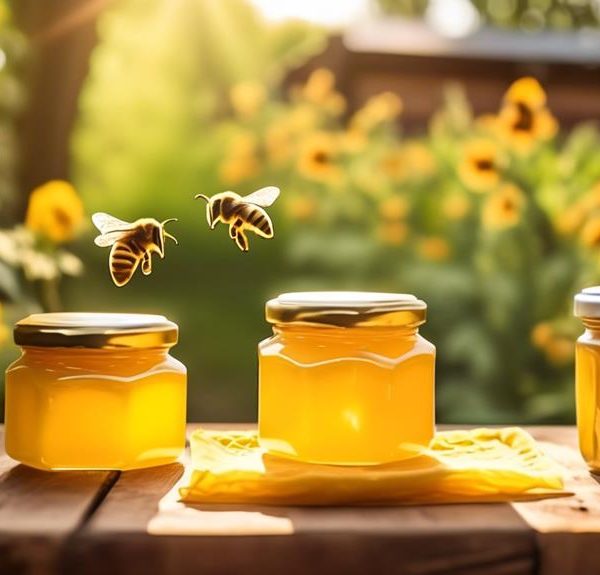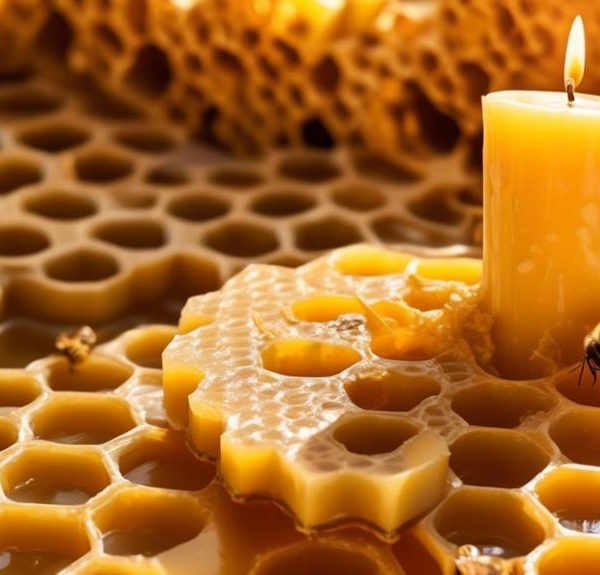Learn the secret techniques to prevent bees from constructing nests in your yard, while maintaining the crucial balance of their existence.
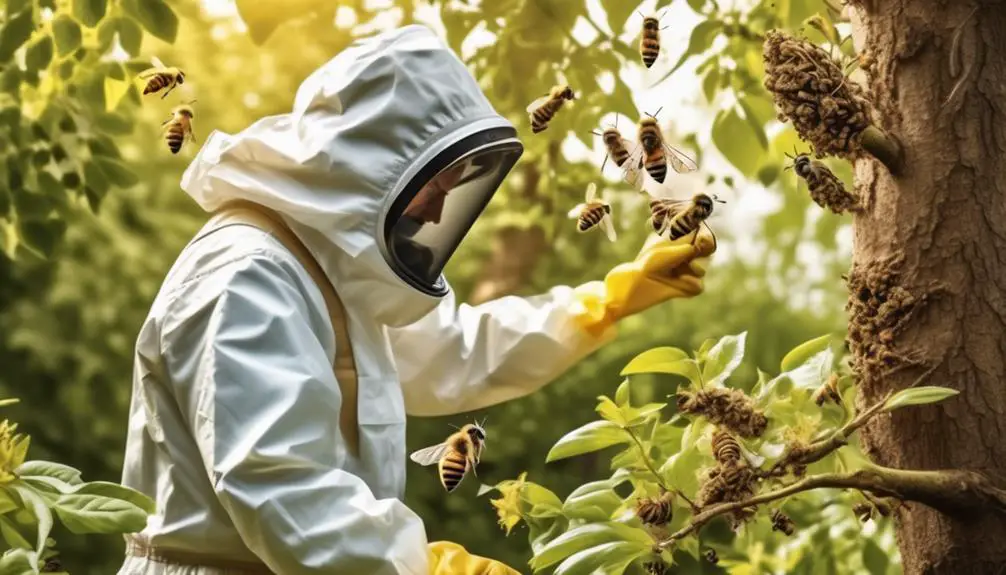
How to Prevent Bees From Building Nests?
Navigating the buzzing world of bees is like walking a tightrope, balancing the need to protect these essential pollinators with the desire to keep your home and garden bee-free. You've likely found yourself wondering how to stop bees from setting up shop in your yard.
As you might guess, it's not as simple as waving a magic wand. There are specific techniques and strategies you can employ to dissuade these buzzing acrobats from building nests in your space.
Stick with us, and we'll unravel this honey-coated mystery together.
Key Takeaways
- Bees choose nesting locations based on safety and proximity to food.
- Regular yard maintenance, such as mowing the lawn and trimming overgrown bushes, can reduce potential nest sites and eliminate food sources.
- Natural bee repellents like citrus peels and essential oils (peppermint, citronella, tea tree) can deter bees.
- Professional bee removal services provide safe removal and relocation options, as well as advice on preventing future infestations.
Understanding Bee Behavior

Before you can effectively prevent bees from building nests, it's crucial to understand their behavior, as their actions often reflect their needs and survival instincts. Bees typically choose a location based on two main factors: safety and proximity to food. They're hardwired to select spots that are protected from predators and harsh weather conditions. Ideally, these locations are also close to a steady supply of nectar and pollen, which are their primary food sources.
If you notice bees hovering around a certain area of your house, it's likely they've identified it as a suitable nesting site. You might think, 'I'll just fill up the holes or cracks they're interested in.' But, bees are persistent. They're capable of chewing through wood, drywall, and even some types of metal. So, merely blocking potential entry points won't necessarily deter them.
Understanding these behaviors is key to effectively keeping these insects at bay. It's not just about eliminating existing nests; it's about making your property less attractive to bees in the first place. Remember, prevention is always easier and safer than removal.
Regular Yard Maintenance

Regular yard maintenance, such as mowing the lawn and trimming overgrown bushes, can play a big role in making your property less enticing to bees. Bees are attracted to lush vegetation and blooming flowers, so keeping your yard tidy and free of potential nest sites is a proactive step towards bee prevention.
Take time each week to mow your lawn and trim bushes. This not only reduces the number of places bees could build their nests, but it also eliminates their food sources, making your yard less appealing. You should also keep an eye out for hollowed-out trees or old logs as these can serve as perfect nesting spots. If you've got any, consider removing them.
In addition to these steps, ensure your trash bins are sealed tight. Bees are drawn to sweet smells and may venture closer to your home if they can smell discarded food or sugary drinks.
Natural Bee Repellents
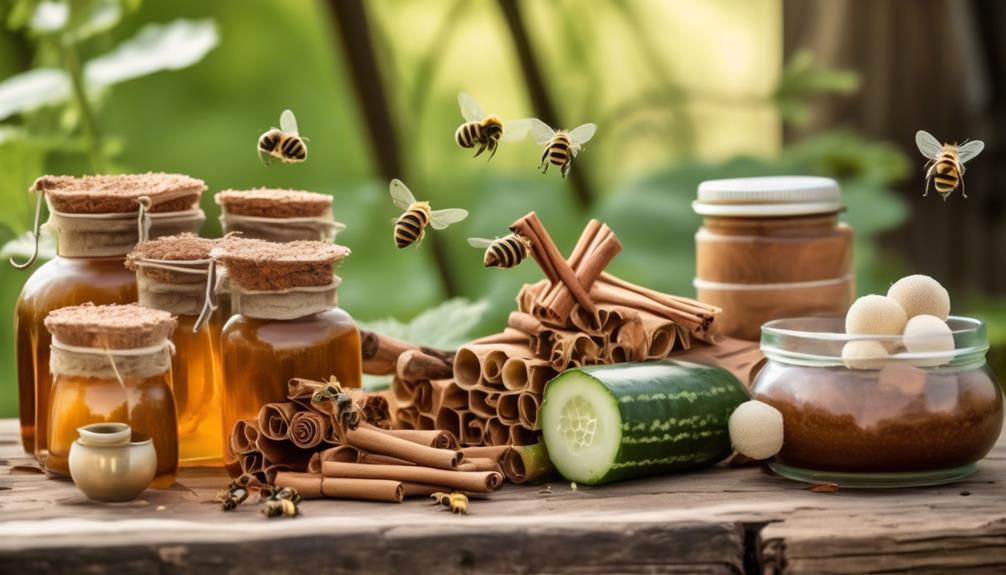
In your quest to deter bees, consider using natural repellents that are safe and eco-friendly. These are non-toxic methods that won't harm the bees or your environment.
One effective natural repellent is citrus peels. Bees dislike the strong scent of lemon and other citrus fruits. Simply place the peels in areas where you've noticed bee activity. Renew them every few weeks, especially after rain.
Another option is to use essential oils. Bees aren't fans of certain scents, like peppermint, citronella, and tea tree. Create a mixture of water and a few drops of these oils, then spray it around your garden or patio.
Mothballs can also deter bees. Hang them in cloth bags around areas you want to keep bee-free. However, be aware that mothballs can be harmful to pets and children if ingested, so use with caution.
Lastly, consider planting bee-repelling plants. Geraniums, marigolds, and mint are a few examples. Not only will they help keep bees away, but they'll also add beauty to your garden.
Professional Bee Removal Services
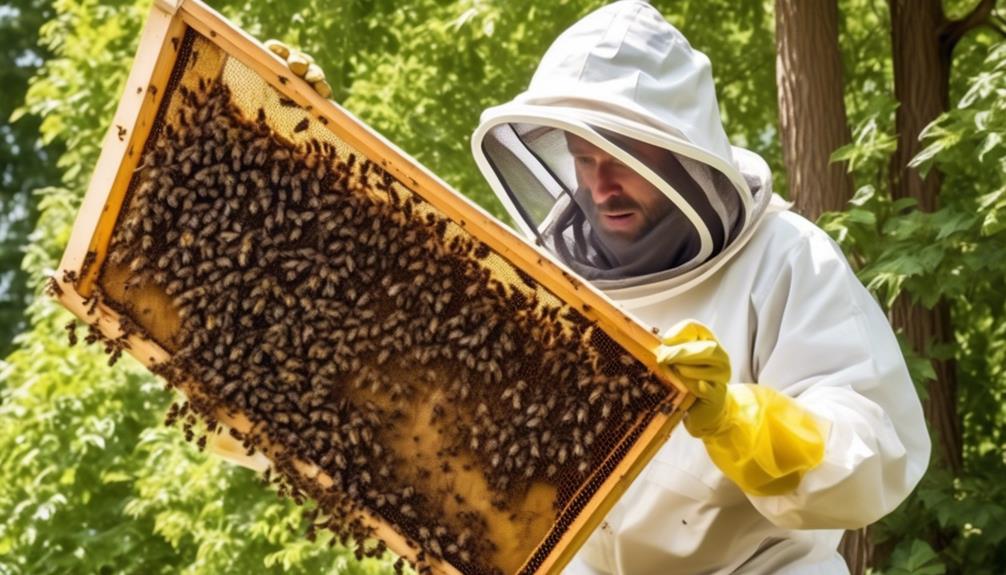
When you're dealing with a persistent bee problem, it's often best to call in professional bee removal services, as they've the expertise and equipment to safely handle the situation. These professionals are trained to efficiently locate and remove bee nests without causing harm to the bees or the surrounding environment. They're also equipped with the right protective gear to avoid stings.
Remember, bees play a crucial role in our ecosystem, so it's essential to ensure their preservation while resolving your issue. Professional services usually opt for relocation rather than extermination, which is a more ethical and environmentally friendly solution.
Moreover, they can provide you with advice to prevent future infestations. This might include sealing off entry points, removing potential food sources, or suggesting suitable repellents.
While the cost of professional bee removal can vary depending on the size and location of the nest, it's often a worthwhile investment considering the risks involved with DIY methods. You're not only paying for the removal but also for your safety and peace of mind.
DIY Bee-Proofing Techniques
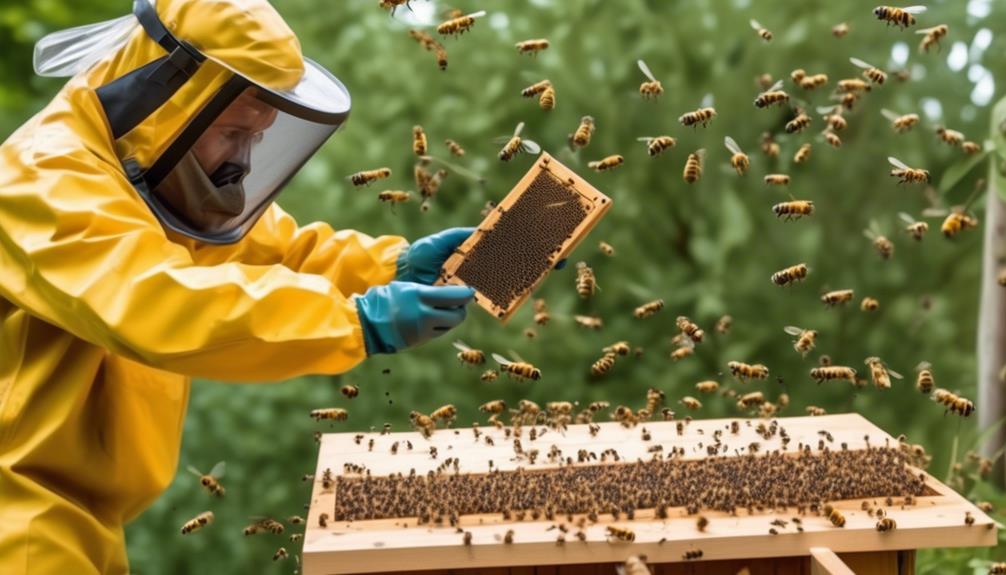
If you're eager to take matters into your own hands, there are several DIY bee-proofing techniques you can employ to deter these buzzing visitors from making a home on your property.
Let's dive into a few practical strategies that'll keep bees at bay.
First, seal up potential nesting sites. Bees love to nest in small openings and cracks – so check your property for any gaps or holes and fill them in with caulk or expanding foam. Don't forget to inspect around windows, doors, and roof spaces.
Next, keep your yard unattractive to bees. This means maintaining your garden regularly, as unkempt foliage and flowering plants are a bee's paradise. Trim back overgrown plants, especially those flowering ones that attract bees. Moreover, cover your trash bins because bees are drawn to sugary residue in discarded food containers.
Lastly, consider using natural repellents. Essential oils like peppermint and citronella are known to deter bees. You can make a DIY spray by mixing a few drops of these oils with water and spraying around your property.
Frequently Asked Questions
What Are the Most Common Types of Bees That Build Nests in Residential Areas?
You're likely to encounter several types of bees in residential areas.
Honey bees often build nests in trees or man-made structures.
Carpenter bees bore into wood to create their homes.
Bumblebees prefer dark, hidden spaces like under sheds or in bird boxes.
Lastly, ground bees, as the name suggests, nest in the ground.
It's important to identify the bee species before attempting any control measures.
Are Bees Protected by Any Environmental Laws That Might Restrict Their Removal?
Yes, there are indeed environmental laws protecting bees.
It's crucial for you to understand that certain bee species are protected under the Endangered Species Act. Therefore, you can't just remove them at will.
Always consult a professional who's aware of the laws in your area. They'll know the best approach to handle the situation without breaking any regulations.
Can Bees Pose a Threat to Pets or Livestock?
Yes, bees can pose a threat to your pets or livestock. If an animal disturbs a bee hive or swarm, the bees may sting in defense. Repeated stings can cause serious harm or even be fatal, especially if your pet is allergic.
It's important to monitor your animals closely, and if you notice a hive, keep them away from it. Should your pet get stung, consult a vet immediately.
What Are Some Common Signs of a Bee Infestation?
You'll notice several signs if bees have infested your property.
Firstly, you'll see bees flying around a specific area, indicating a nest nearby.
You might also notice a buzzing sound or bees entering and exiting a hole in your house.
Dark, sticky spots on walls and a honey smell could signal a hive inside your home.
Always remember, if you suspect a bee infestation, it's best to call a professional beekeeper or exterminator.
What Should I Do if I'm Allergic to Bees and Find a Nest on My Property?
If you're allergic to bees and discover a nest, don't attempt to remove it yourself. Immediately clear the area and avoid any agitation. Reach out to a professional pest control service who can safely remove the nest.
Meanwhile, talk to your doctor about carrying an EpiPen for emergencies.
Always wear covered clothing outdoors, especially near flowering plants, to reduce chances of getting stung.
Conclusion
In conclusion, understanding bee behavior and maintaining your yard are two important steps in preventing bees from nesting. By learning about their habits and preferences, you can make your property less attractive to bees. This includes keeping your yard clean and free of potential nesting sites, such as piles of debris or hollow trees.
Using natural repellents can also be effective in deterring bees from your property. There are several options available, such as planting bee-repelling plants or using essential oils that bees find unpleasant. These methods are safe for both humans and bees and can help create a bee-free environment.
In some cases, it may be necessary to seek professional services or use DIY techniques to remove existing bee nests. Professional beekeepers or pest control experts can safely relocate the nest without causing harm to the bees. If you choose to handle the situation yourself, make sure to research and follow proper protocols to ensure the safety of both yourself and the bees.
It's important to remember that bees are vital for our ecosystem, so the goal should be to deter them, not harm them. We should aim for coexistence rather than extermination. By following these good practices, you can maintain a bee-free home while still contributing to a healthy environment. You've got this!

